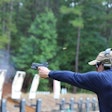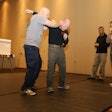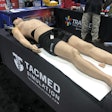Consider a hostage barricade situation and the multi-pronged response from law enforcement that such an incident can spawn.
First to arrive on the scene are patrol officers, maybe a K-9 unit or two, and possibly even a chopper to effect containment. Then comes the incident command officers, the hostage negotiators aided perhaps by a mental evaluation team, and the tactical unit. In the field, the tactical unit may receive intel gathered by investigators and the technical surveillance. And finally, once the whole mess is over, the detectives come in to gather evidence and interview witnesses.
OK, that's a simplification. I left out the PIOs who corral and engage the media, the internal affairs investigators who go to work should the bad guy get shot, and myriad other officers who swing into action when some whack job decides to shoot up the neighborhood and take his family hostage.
The point here is that nothing in contemporary police work is simple. And today, the generalist cop is quickly becoming a relic of the past.
For smaller agencies, one officer may don any number of these hats. But on larger agencies, establishing special units that possess critical expertise and experience has become a priority.
Welcome to the age of specialization in law enforcement.
Tim Jordan, a training sergeant with the Naperville (Ill.) Police Department, notes that specialization has helped his agency successfully prosecute cases.
"For us, the shift from generalist to specialist started around 1991—shortly after the arrival of our new chief (David Dial). Up to then, we had a generation of generalist cops, the kind of 'soup to nuts' cops who were jacks of all trades and had a good handle on case development. They might get a bad check case and go out, interview witnesses, victims, suspects, and develop info. They'd then go out and get warrants, and serve them, too. But invariably, the time spent doing such investigations came at the expense of other patrol functions—increased patrol presence, targeting local problem children. Since then, we've augmented our investigative division and let developed case investigators handle such crimes."
Identifying the Specialist
There is no shortage of inducements to work specialized units. Cool tools, flexible schedules, prestige, and the ability to work at something one is truly interested in are but a few of the perks.
Many agencies have discovered that developing specialists is less a case of identifying prospective players than just allowing people to gravitate where they're destined to be. Larger agencies with huge gene pools allow for conditions wherein the cream—absent the usual political mitigators—rises to the top. Historically, the would-be specialist exhibited an eye for a particular type of crime, a talent for getting suspects in custody, and an ability to get the job done.
But with so many people coveting such positions, getting the assignment may require the candidate to get an edge.
Beyond supplemental training and networking, Lt. Mike Parker of the Los Angeles County Sheriff's Department sees two core components that will help people get to where they want to go in law enforcement.
"Finishing a bachelor's degree and learning a foreign language are huge considerations," Parker says. "Neither will necessarily help you get hired in the first place, but once you're on the job, they will open doors and heighten your prospects for promotion. Your knowledge base coming into law enforcement will accelerate your career path."
Parker's points are underscored when you examine where such factors are missing from a skill set such as in those instances where those making the decision may be looking for a means of thinning the herd. "Well, all things being equal, this other candidate has a degree, whereas you…"
This is particularly true in an era wherein specialized skill sets are increasingly coveted. In general, agencies are less concerned with the nature of the degree than the fact that an individual has acquired one.
The presumption that the college graduate is capable of multitasking and exhibits a certain amount of intellectual flexibility—ideally, both ideologically, and technically—is a powerful bias. It comes with the implicit belief that higher education requires persistence while providing ancillary benefits such as the acquisition of problem-solving skills. It is also widely believed that the educated officer is less likely to use force or to use a degree of force higher than that warranted for a given situation.
As law enforcement operates at a more multinational and multicultural level than ever before, specialization may include immersing oneself in extra-cultural research. Twenty years ago, you didn't have officers signing up for foreign language courses such as Arabic or Chinese, a reality today.
Specialized language skills can expose officers to varied assignments. Consider the benefits of language skills in my former agency, the LASD. Speaking Russian can get you on the fast track out of working custody and into West Hollywood Station. Vietnamese-speaking deputies are coveted at Temple Station. Different dialects of Chinese will find you being recruited to Walnut Station. Deputies may also find themselves getting more interagency exposure, such as when federal investigators flag a deputy to work a wiretap operation by virtue of his or her ability to converse in another tongue.
Moreover, in many ethnocentric enclaves, learning the language may be less a case of keeping the peace or ensuring that people get along. It can be a matter of life or death. More than one officer has been able to detect a threat by understanding a language that the bad guys thought he or she didn't understand.
Policing in the Information Age
Perhaps nowhere in law enforcement is specialization more readily and tangibly apparent than in the technological arena.
According to the 2003 Law Enforcement Management and Administrative Statistics (LEMAS) survey, more than 80 percent of local law enforcement officers work for agencies that use some form of mobile digital terminal or computers in patrol cars. Mobile data systems allow officers to document arrests; capture photographs, videos, and audio tape recordings; and receive instant verification of vehicle and suspect identities in the field. This has paved the way for increased officer patrol time, improved conviction rates, and greater officer safety. All of this technological know-how and capability, however, does not come out of a box ready to use.
Considerable expertise is required to evaluate the electronic needs of a department, implement the necessary programs and databases, and train officers in their effective use. Even more specialized is the ability to analyze data and trends utilizing the numerous federal, state, and local crime databases currently available to law enforcement.
With the proliferation of computer crime and identity theft, police and sheriff's agencies must also be able to keep pace with a new breed of criminals: those who steal information and intellectual property rather than physical possessions.
Gutting the Patrol Ranks
So how does the creation of specialized units affect those stalwart officers who choose to remain on the front lines of law enforcement?
First of all, the generalist is not dead. He or she just needs to be flexible and versatile. Those who can readily adapt to their changing environment and who are willing to wear as many hats as are thrown at them will continue to thrive.
It's just that those who excel in any one area are likely to be plucked out of the general lineup to serve in the growing numbers of specialized units.
For example, whiz-bang computer skills have seen many a computer savvy officer's skills get exploited, first in correcting or designing some needed database, to eventually being appointed scheduling officer or computer guru.
However, the attraction of specialty work for veteran patrol officers may have a serious effect on the quality of patrol officers on the street.
Joseph F. King, associate professor in the Department of Law, Police Science, and Criminal Justice Administration at the New York-based John Jay College of Criminal Justice, notes that specialization cleaves both ways, impacting both operationally and personally, in ways both favorable and not.
"Specialization in larger departments can be a good addition to patrol," notes King. "But these officers have to come from somewhere—usually patrol—leaving it under-manned, or where it ends up with a less favorable ratio of rookie officers to experienced officers."
In the sink or swim world of law enforcement, it may become a reality that more and more officers may work patrol for shorter and shorter periods of time. The quicker rotations out of patrol will ensure that less seasoned patrol officers remain on the street. Already, fully 20 percent of some agencies' sworn personnel have less than two years on the job.
Patrol officers also lament that personnel otherwise destined to work a particular shift are sent to training instead, often without backfill. Meanwhile, those who remain behind, but nonetheless covet the same investigative, strategic, logistical, or tactical knowledge, inadvertently are deprived of it.
Officers who spend an inordinate amount of time in training may become insulated from patrol and from one another, becoming barriers to the successful dissemination of information to where it can be of greatest use.
Hopefully, patrol officers will continue to receive supplemental training, such as first aid, force, and range training that they've historically been given. But the smart officer will find a particular niche that he or she is interested in and start working toward it.
[PAGEBREAK]
Agencies in Transition
For those agencies still on the fence about letting their officers pursue specialties, Sgt. Jordan offers this food for thought. "Do you want to take a shotgun approach to a particular situation and have someone who may or may not have been trained once on the matter two or three years ago basically feeling their way through an investigation? Or do you want to zero in on it like a sniper, targeting cases with the investigators who know how to streamline things and get it done accurately and quickly?"
Jordan is quick to acknowledge that his agency has two unique factors working in its favor to make the philosophical, practical. First, it is large enough to accommodate investigative units, and second, it has a relatively low number of part one crimes—a reality that many similar size agencies do not enjoy.
If evaluating the success of specialized units is difficult, it becomes more so when it is undermined .
Special units may become de facto manpower pools, continually ripped off to support yet other special teams and establishing day-to-day goals so that their missions become increasingly amorphous.
As James G. Wilson, author of "Varieties of Police Behavior," notes, "The law enforcement orientation of most departments means that specialized units are created for every offense that the community expresses concern on or for which some special technology is required. The patrolman, who once had the opportunity to perform some investigative functions, sees his scope of activity increasingly narrowed until what remains for him is clerical work, service work, and, of course, order maintenance."
Operationally, specialized units pose other problems. Within their respective fields of concern, new subsets of problem areas may arise, causing specialized units to branch off from one another, bifurcating and trifurcating, with each succeeding unit becoming at once more answerable to any number of higher entities, yet increasingly autonomous in its daily operations. Unchecked, they can become cancerous, metastasizing and threatening the very organization that supports them. Indeed, some of law enforcement's most infamous corruption episodes have evolved out of specialized units such as narco and vice; surveillance details have been abused for purposes of political gain and payback.
In January, 150 NYPD narcotics cases were reviewed in the aftermath of corruption allegations involving officers who had sex with prostitutes, stole evidence, and gave dope to informants. Three years earlier, an internal review of the unit found the quality of staff dipped when it went from an elite group of about 1,500 cops to more than 4,300 officers. According to the report, this resulted in "a significant infusion of unqualified, inexperienced personnel who lacked the dedication and drive essential to a highly specialized unit."
"Rarely do we create a unit or section without first looking at the impact it will have on the organization," says Capt. Grove. "Our Planning and Research Division has an audit unit that conducts efficiency audits in an effort to utilize the most effective structure. We have also recently tasked an outside contractor to take a look at our organization and the results of that consultation has produced a plan labeled 'Blueprint for the Future.' This plan…places us in the best possible position with the resources we have. Additionally, a few of the sections and units in the old structure were either eliminated or moved to a more compatible or functional place within the organization. We look at other departments for their innovations; however, we are careful not to take information at face value. It is clear to us that departments are based on the community they serve."
Paying Up Front
While acknowledging a need for specialization, the Oregon State Patrol saves itself migraines by keeping its investigative and patrol divisions separated. Annual budget commitments for each division remain largely immune from one another, and once earmarked for a particular division—or agency, such as Fish and Wildlife—monies from one budget silo can't be channeled to another without state legislative approval.
"Quite simply, we can't rob Peter to pay Paul," observes Lt. Glenn Chastain, assistant commander for the Patrol Services Division. "This is how we mitigate losses in other divisions."
By maintaining strict fiscal guidelines while allowing for outside funding, the agency allows its Criminal Division investigators to work any number of permanent or short-term assignments, ranging from construction fraud to tobacco tax enforcement, while becoming cross proficient in a multitude of aspects of criminal investigation.
If there is a liability to such investigative commitment, it is when officers who might otherwise be inclined—or at least willing—to investigate particular crimes are relegated to the sidelines. For some agencies, the dynamic can become a self-perpetuating one, with those senior officers deprived of developing such coveted skills getting left behind.
And without increased funding, it is a situation that is apt to get worse before it gets better.
Specialization will only become more of a fixture in law enforcement in the future. As more and more facets of the job come to demand unique knowledge, there will be commensurate demand for people with credible expertise to deal with these new frontiers. These people will continue to find themselves in increasingly nuclear clusters, often working autonomously; hopefully, not at the expense of necessary in-house communication, and not to the detriment of the mission at hand.
Ultimately specialization's success will continue to be dictated by the extent to which it is both embraced and soundly exercised.
In January 2008, POLICE Magazine launched a year-long article series focusing on the “state of American law enforcement.” If you’d like to read the other chapters, click on the links below.
Chapter 1: The Thinning Blue Line. Law enforcement agencies nationwide are competing for a dwindling population of recruits.
Chapter 2: The Blue Mosaic. Policies meant to diversify law enforcement agencies have changed police demographics and will continue to do so in the future.
Chapter 3: Teaching to the Test. Does law enforcement training focus too much on qualifying and not enough on skills that can help you win fights?
Chapter 4: A Love-Hate Relationship. Most people only meet an officer when they are arrested, questioned, or cited. That makes it hard for them to like cops.
Chapter 6: Women Warriors. Female police officers must walk a fine line between fitting in and making their own way in law enforcement.
Chapter 7: Working on the Front Lines. The patrol officer is the backbone of American policing, but a lot of agencies don’t want to admit it.
Chapter 8: SWAT: Breaking the Mold. Agencies nationwide model their tactical teams on LAPD SWAT. So what does it mean if that unit changes its policies to be more politically correct?
Chapter 9: Stopping the Next 9/11. Improvements in intelligence gathering, training, and equipment give you a good chance of preventing the next attack and saving lives if it happens.
Chapter 10: Rules of Engagement. Today’s law enforcement officer is the best trained and best equipped cop in history, so why do policy makers think you have the judgment and intellect of children?
Chapter 11: Gangster Nation. Big city street gangs have taken root in small town America, bringing mayhem to Main Street.
Chapter 12: Damned If You Do, Damned If You Don't. When a cop uses - or doesn't use - a less-lethal weapon in contemporary America, there can be hell to pay.

















